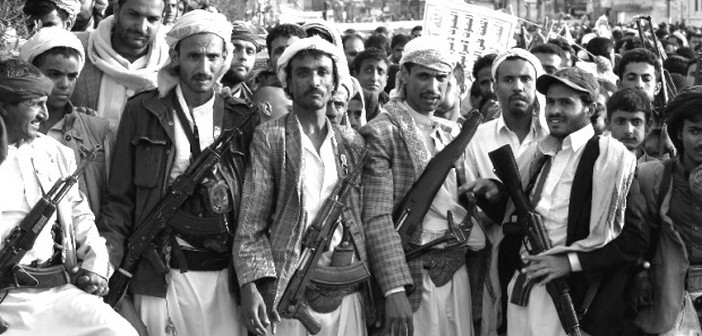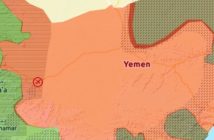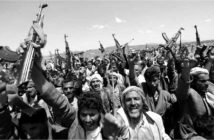The Saudi-led war on Yemen has entered the fifth month without any sign of significant difference on the ground. However, the progress recently realized in Aden has provided a glimpse of hope that things will start changing for the better. The government troops backed by the coalition airstrikes and popular resistance fighters have already managed to drive the Houthi-Saleh alliance’s fighters out of the seaport city. This can be described as a symbolic victory and may be a game changer.
Aden is the most important city in Yemen after the capital Sana’a. The battle is not finished there yet. The rebels are still fighting in the surrounding areas but they cannot launch a serious counterattack. The rebels are cut-off, their military might is stretched thin and it is quite difficult for them to get any reinforcements from the north.
Recapturing Aden is vitally important for the legitimate government to operate inside Yemen. Realizing this fact, Saleh has been very keen to capture the city, which has always provided an alternative to Sana’a. Rebels invaded Aden in order to deny Hadi’s government a suitable seat inside the country. Securing Aden may take more time and there is still much work that needs to be done. However, President Hadi described the progress in Aden as significant, arguing that it will prompt more victories in other governorates.
Briefly what happened recently in Aden has marked a shift in the battles on the ground. But in a fall-out civil war such progress should not be overestimated nor underestimated.
Who is in control now?
No party in Yemen can claim to be in control at the moment. The Houthi-Saleh alliance is portrayed as a rebel group. They are isolated locally, regionally and internationally. It is very difficult for them to run a conflict-stricken country. The former envoy of the UN to Yemen, Jamal Benomer, made it clear: Neither Hadi, nor the Houthis can unilaterally govern Yemen. He is perfectly right.
Meanwhile the legitimate government is unable to operate on the Yemeni soil. Almost all Yemenis know that this crisis can’t be solved militarily. By the end of the day a political solution is necessary. Unfortunately Yemeni leaders are no longer in control. The decision is now in the hands of regional and international players. Mainly Saudi Arabia, Iran and the USA.
The Nightmare of economic collapse
Negative economic growth was estimated at -12.9% last year. The poor economic performance has continued during the first and second quarters of the current year.
A report issued by the Ministry of Planning and International Cooperation recently indicated that annual per capita GDP relatively improved following the Arab Spring Uprising from $1.280 in 2012, up to $1.343 in 2013, then it reduced to $1.261 in 2013, but apparently per capita has seriously decreased recently as millions have lost their jobs.
The State’s general budget of 2015 has not yet been approved. So it is very difficult to find out the recent economic deteriorations in the first and second quarters of 2015. As the Houthis announced the general mobilization, requiring the state to devote most of its financial and material resources to the war in the south, the rebels groups have prevented all ministries from publishing data about the economic situation for reasons of secrecy given the war.
Oil industry damaged
Oil sector provides about 70% of the state general budget, and makes up to 80% of the country’s exports, contributing approximately 20-30% to the GDP. Today, the oil sector has almost been crippled. Six of the major oil and gas companies are reported to have left the country. A great number of oil and gas fields are closed. The oil produced has seriously decreased by 45% over the first quarter of 2015. The Aden Refinery Company has been destroyed by the war. Some 80,000 barrels of crude oil used to be refined by the facility.
The local and international transportation sector has gravely suffered from the war. The Yemeni Airways Company is reported to have been losing $6 million dollar every day, according to the company’s business manager. Meanwhile the tourism sector is reported to have suffered losses of about $110 million.
Agricultural sector paralyzed
The agricultural sector has suffered grave loses estimated at $6 billion dollars, according to a governmental study. The caretaker of the Minister of Agriculture and Irrigation, Mohammed Yahya Al-Ghashm, described the agricultural sector as paralyzed. In a press conference held in Sana’a in early July he called on the international community, UN and FAW to pay the fair compensations for the devastating damages caused by the Saudi-led coalition war.
For his part the Director of the Agricultural Media and Guidance Majed al-Mutwakil said “the primary damages and losses that the agricultural sector has been sustained since January 2015 until June are estimated at $6 billion and $360 thousand dollars. Three billion direct loses and the remaining are indirect damages because of fuel shortages. Some 54% of Yemeni manpower works in agriculture. Large swathes of arable lands have been threatened of deforestation. Hundreds of fruit plantations are at risk.
The FAO reported that 11 out of the country’s 26 million total population are facing acute food insecurity, while 16 million need some humanitarian assistance.
The UN announced in the outset of July that it has raised the state of emergency in Yemen up to grade three, the highest the UN has ever announced. There are some 21 million people (about 80% of Yemen’s total population) that need urgent humanitarian aid. Meanwhile 13 million are suffering food shortages and nine million are lacking clean water, according to the UN.
The Studies and Economic Media Center, a Sana’a–based organization, announced in the beginning of July that 2.8 million families, about 75% of the population are in need of urgent and sufficient aid.
The UNICEF announced that 2.5 million children in Yemen are subject to Diarrhea and 1.5 million are suffering acute malnutrition.
More than 3600 people have been confirmed killed and tens of thousands wounded in the war across the country since the beginning of the current conflict.
As many as five million people are reported to have fled the conflict regions. They went to the internally displaced people camps or their own villages in the countryside.
Unemployment and Poverty
The political crisis and armed conflict has further exacerbated Yemen’s economic hardships. More than three million Yemeni workers out of five million are reported to have lost their jobs, according to the deputy president of the General Union of Workers. Consequently, more millions of Yemenis have come to live under the poverty line. As a result hundreds of thousands of young Yemenis are going to be recruited by terrorist groups and warlords. In wartime there is only one profession that flourishes: fighting.
Now, the young unemployed Yemeni men have no choice but to submit their application forms to the Houthis, Al-Qaeda and IS. Only these Islamist militant organizations can offer job-opportunities.





1 Comment
I think the UN has the key of this blockage in Yemen, they must support the Arabian alliance to end this game.
Ali Saleh should get a fair trail ..